Saturday Feb 21, 2026
Saturday Feb 21, 2026
Tuesday, 1 August 2017 00:01 - - {{hitsCtrl.values.hits}}
Calls on Govt. for consistent policies, diversified export basket with quality and quantity
Claims past regimes completely neglected export sector
Use of GSP+ imperative for Sri Lanka to boost competitiveness of exports into EU
Says being proactive on what currently needs to be done must be instilled in minds of all decision-makers
Affirms readiness to support Govt. to shape future of Sri Lanka’s export sector
By Charumini de Silva
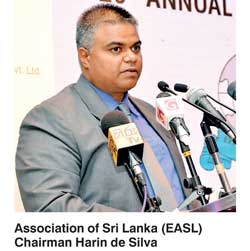 Exports are at an extremely critical junction with Sri Lanka facing a massive challenge in being competitive, said newly-incumbent Exporters’ Association of Sri Lanka (EASL) Chairman Harin de Silva, calling for sound and consistent policies along with a diversified basket of goods of exportable quality and quantity.
Exports are at an extremely critical junction with Sri Lanka facing a massive challenge in being competitive, said newly-incumbent Exporters’ Association of Sri Lanka (EASL) Chairman Harin de Silva, calling for sound and consistent policies along with a diversified basket of goods of exportable quality and quantity.
Addressing the 20th Annual General Meeting (AGM) of the EASL, he pointed out that regimes of the past had completely neglected the export sector of Sri Lanka for far too long, which resulted in exports declining year by year to the point at which they find themselves today.
Capacity constraints
He stressed that capacity constraints in terms of labour shortages was one such challenge and an issue that had been highlighted in many forums by stakeholders ranging from multinational organisations right down to SME levels.
The Chairman also said limited production capacities had heavily hampered the Sri Lankan export fraternity in catering to the additional demands that GSP+ would now bring to the country.
With Brexit now unravelling in the EU, he asserted that Sri Lanka was faced with a very unique challenge that would have a negative impact on realising GSP+ benefits, especially for sectors such as apparel as the UK accounts for 40% of Sri Lanka’s apparel exports into the EU.
“Taking all of the above into consideration, the Government of Sri Lanka must now set about helping the export sector of our country to reap the benefits of regaining GSP+. Authorities like the Export Development Board (EDB) and Foreign Ministry with its diplomatic missions overseas must now help prospective exporters find new markets and opportunities for Sri Lanka to re-enter markets based in the EU. It is absolutely imperative that Sri Lanka use this window to boost competitiveness of exports into the EU,” de Silva stated.
Be proactive
He said it is no secret that the present Government is finding it hard to carry on business as usual and walk the talk owing to the scale of the problems that they inherited from the previous regime.
He noted that Sri Lanka’s need to adopt, adapt and improve to deal with such challenges now matters far more than it did in the past and being proactive on what currently needs to be done must be instilled in the minds of all decision-makers who are involved in Government.
“In the EASL’s engagement with various Government institutions and ministries, something we see very frequently is bureaucratic red tape and overlapping functions of several ministries, which in turn completely distorts the creation and outcomes of strategic initiatives that the Government is trying to put in place. This invariably results in the formulation of inconsistent policy changes that have very far-reaching effects on export and trade. We believe in a sound national policy where all stakeholders, ministries and institutions are on the same page and accountable parties are given ownership on delivering on what they have promised,” de Silva added.
He said time and again EASL has stressed on the importance and need for a strong and positive political will and vision to drive the export sector to reach its full potential.
National Export Strategy
Noting that earlier this year the Government extended the EASL an opportunity to be a member of the core team that is currently in the process of formulating the National Export Strategy (NES) Sri Lanka, de Silva said during the past two years EASL had developed two documents under the title ‘Recommendation for a NES’.
“My committee and I set about identifying cost cutting issues at a macro level via extensive consultations with our membership and stakeholders in the export fraternity and economists who specialise in the field of exports. The support and appreciation we received from all policymakers with whom we shared this document was extremely encouraging and positive. We are now in the process of developing a third such document during the course of this year.”
He emphasised that in formulation of each of these documents, they came across several key factors, which includes limited basket of products which Sri Lanka have developed to match internationally-accepted standards, lack of appropriate incentives being offered especially for SMEs, disconnect between industry and educational institutions hampering innovation, inability to attract FDI which brings in not only valuable funds, but technology and access to market, sub-optimal use of FTAs currently in place between Sri Lanka and foreign states, frequent increases in cost of production such as the cost of power, impositions of statutory charge accompanied by wage structure that doesn’t encourage the rewarding of employees on the basis of productivity which in turn affects competitiveness, need for consistent policy and the lack of political will to develop the export sector of Sri Lanka, lack of clear political objective and duplication of ministerial functions and external global factors which have direct impact on Sri Lanka.
He said the NES not only highlighted the Government’s willingness to work with reputed stakeholders from the export sector, it had also gone a long way in making sure that the Government realises the importance of Public-Private Partnerships (PPPs) in shaping the future of Sri Lanka’s export policies.
“I believe EASL and the Government have a long walk together and I would like to let the Government know that we are by their side to help realise their dreams for the export sector,” de Silva added.
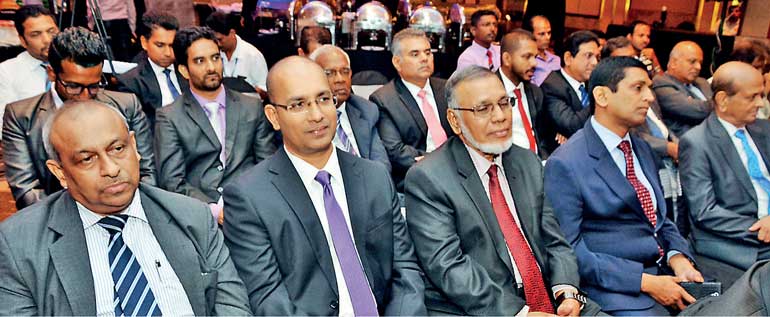
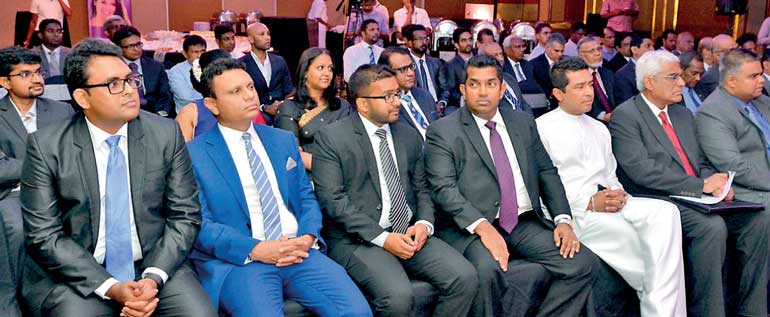
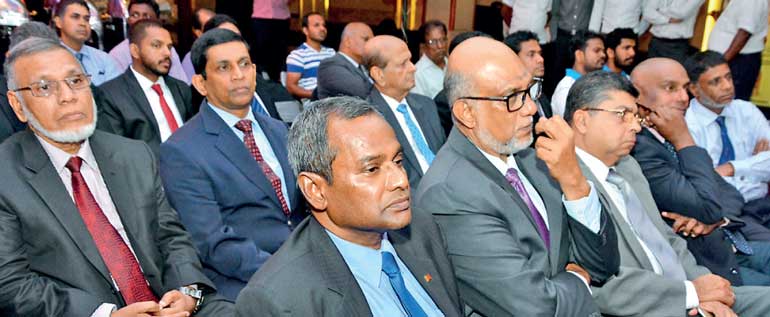
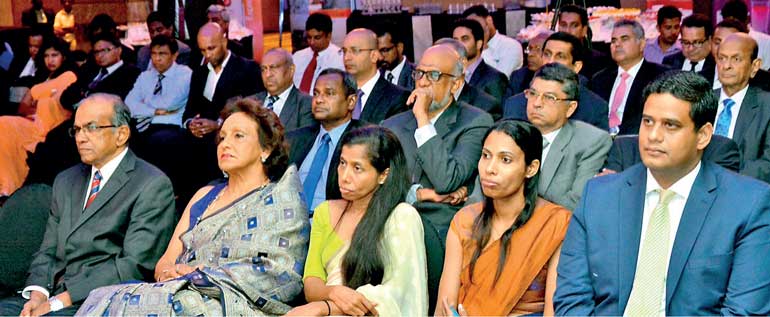
Pix by Upul Abayasekara